|
Know what’s happening across Oceania—before your coffee’s cold.
OCEANIA MARKETS
|
|
|
|
|
|
ASX 200 and NZX 50 Data Provided By:

|
|
*Market index data sourced from official exchange publications and financial data aggregators. ASX and NZX data reflect end-of-day figures from the Australian and New Zealand stock exchanges respectively. SPX (South Pacific Stock Exchange) figures reflect the most recent published data.
|
|
REGIONAL NEWS
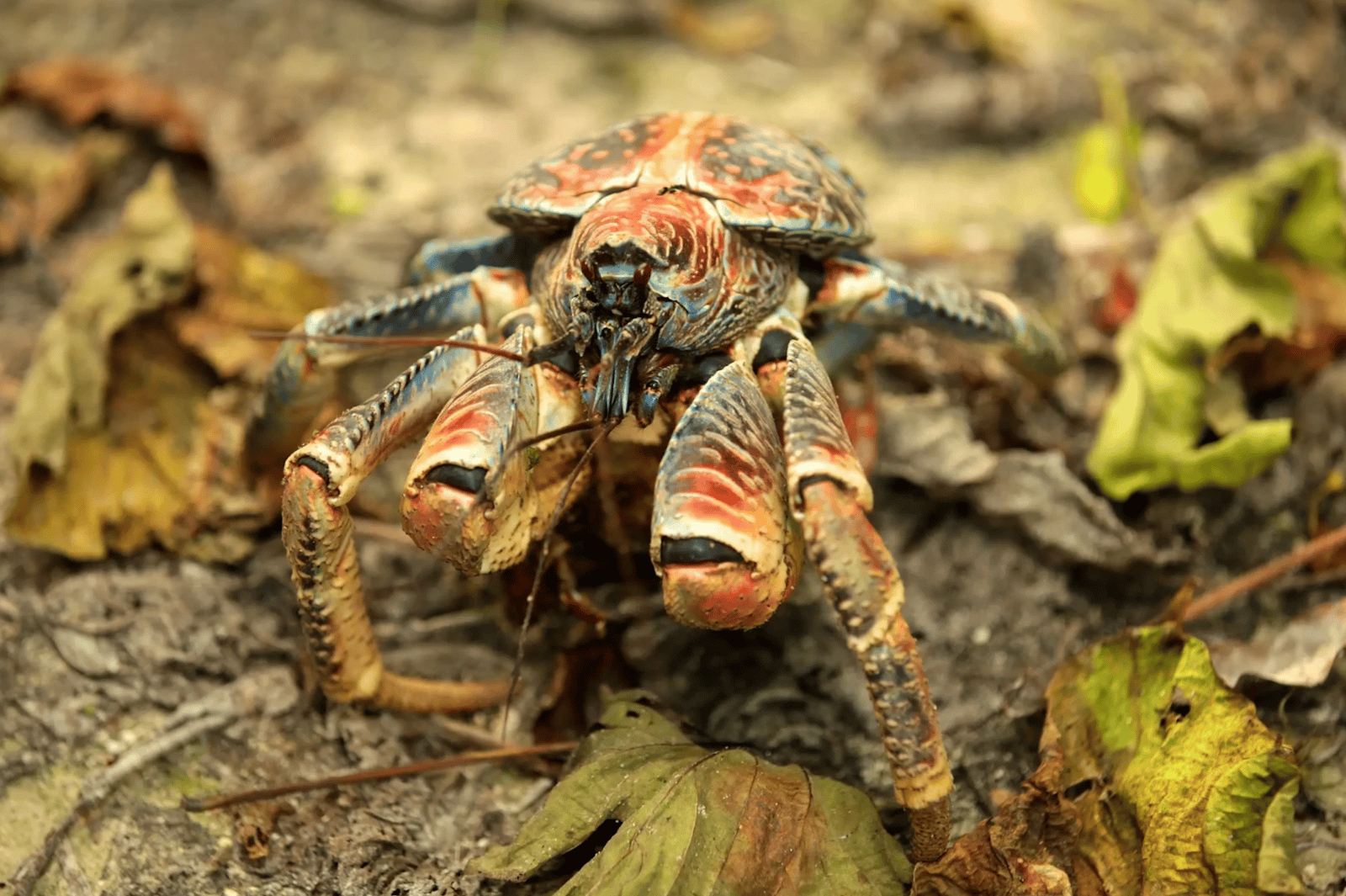
A coconut crab, the world's largest land arthropod, navigates its island habitat. The Solomon Islands' new harvesting ban aims to protect these remarkable creatures during their critical breeding season. Photo Credit: DIAC Images, Animalia.bio
Solomon Islands Implements Groundbreaking Coconut Crab Protection Ban
|
The Solomon Islands has enacted its first-ever coconut crab
harvesting ban in Guadalcanal Province, running from June 1st through October 31st, 2025. This historic conservation measure targets the protection of the world's largest land arthropod during a critical period for the species. With the maximum leg span of 1 m (~3 ft) and weight of 3 kg (6.6 lb), it is the largest invertebrate animal you will find on land, making these remarkable crustaceans both ecologically significant and vulnerable to overharvesting pressures.
|
|
The timing of this ban coincides with the coconut crabs' breeding season, when conservation efforts are most crucial for population recovery. Coconut Crabs cannot breed till they reach about 9 years old, and thereafter reproduce only once per year, making them particularly susceptible to population decline from excessive harvesting. The extended maturation period and limited reproductive frequency mean that protecting breeding adults during this critical window could have lasting positive impacts on the species' long-term survival in the region.
|
|
This conservation initiative reflects a growing recognition across the Pacific of the coconut crab's precarious status. Coconut crabs have seen a huge decrease in population due to overharvesting and increasing demand from tourist restaurants, with similar protective measures already implemented in places like Guam, Vanuatu, and the Northern Mariana Islands. The Solomon Islands' proactive approach demonstrates how local conservation actions can contribute to broader regional efforts to preserve these unique creatures that play vital roles in island ecosystems as both predators and seed dispersers.
|
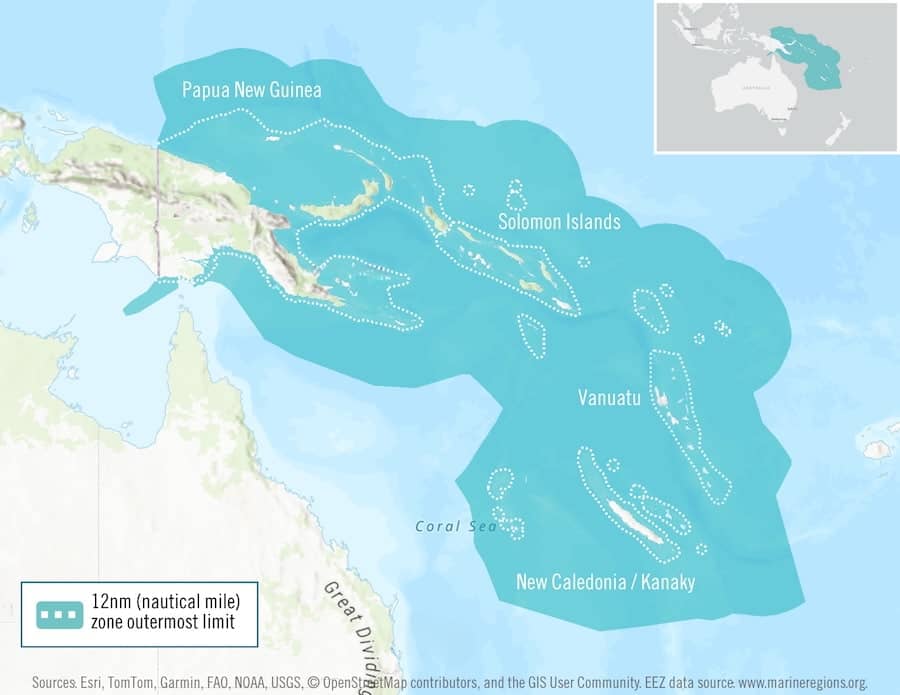
The new Melanesian Ocean Reserve will protect 6 million square kilometers of these ancestral waters through the world's first Indigenous-led multinational marine conservation initiative. Photo Credit: Melanesian Ocean Reserve
Pacific Nations Pioneer Revolutionary Indigenous Ocean Conservation Model
|
The recently announced Melanesian Ocean Reserve
represents a paradigm shift in global marine conservation, becoming the world's first Indigenous-led multinational ocean reserve spanning at least 6 million square kilometers across the combined waters of Solomon Islands, Vanuatu, Papua New Guinea, and New Caledonia—roughly the size of Australia or larger than the entire Mediterranean Sea. This groundbreaking initiative challenges the traditional Western-led conservation model by placing Indigenous knowledge and governance at the center of ocean protection efforts.
|
|
The reserve concept
was developed through collaboration between Solomon Islands' Minister for Environment Trevor Mahaga, Vanuatu's Environment Minister Ralph Regenvanu, and Papua New Guinea's Fisheries Minister Jelta Wong, working alongside Indigenous-led organizations including Nia Tero and the Islands Knowledge Institute. The reserve aims to prevent unsustainable extraction and exploitation that threatens both marine ecosystems and Indigenous ways of life, while ensuring only sustainable economic activities consistent with Indigenous values are permitted.
|
|
The initiative's potential
to influence global ocean policy extends far beyond the Pacific, as WWF is working with coastal communities worldwide to encourage governments to formally recognize community-led conservation work and support Indigenous ocean protection efforts. The leadership of figures like Nia Tero's Indigenous CEO 'Aulani Wilhelm and Solomon Islands-based ecologist Dr. Edgar Pollard from the Islands Knowledge Institute demonstrates how Indigenous expertise combined with government commitment can create transformative conservation outcomes.
|
PRESENTED BY VONU STUDIOS
Oceanian Animated Videos For Kids: Pawpaw Kids TV
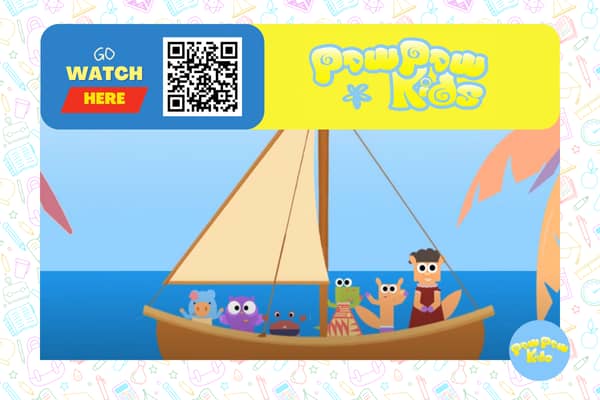
|
Pawpaw Kids TV is a YouTube channel dedicated to engaging and educational content for children, with a specific focus on the Oceanian region. The channel features the Pawpaw Explorers—Illy the Iguana, Mo the Mongoose, and other animated characters—who embark on adventures that introduce young viewers to local wildlife, ocean currents, and cultural stories.
|
Pawpaw Kids TV offers a Pacific blend of entertainment and learning, making it a valuable resource for children to explore the rich cultures and natural wonders of the Oceania region. Simply scan the QR code to visit the Pawpaw Kids TV YouTube channel or click this link:
YouTube Link: Pawpaw Kids TV
|
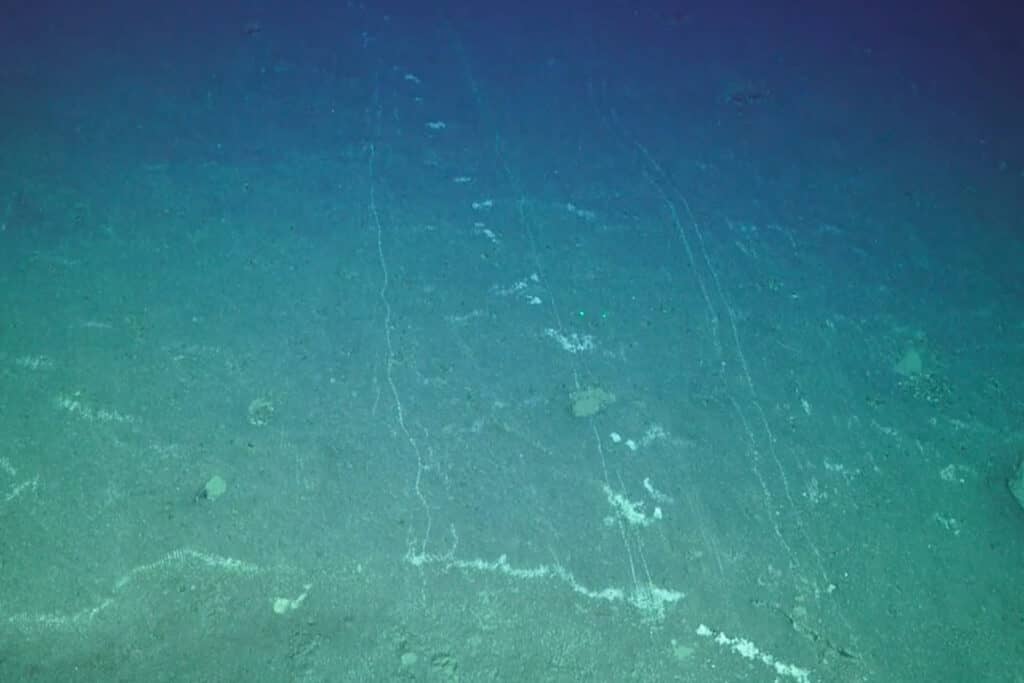
Global divide deepens over deep-sea mining: while the U.S. opens the ocean floor to exploitation, Pacific nations join a 37-country push to halt the industry before irreversible harm is done. Photo credit: Amy Baco Taylor/Greenpeace
Pacific Nations Lead Global Push Against Deep Sea Mining
|
Solomon Islands joined the Marshall Islands in signing a moratorium against deep sea mining at the UN Ocean Conference in Nice, France (June 9-13, 2025), adding momentum to a growing international coalition opposing the emerging industry. Thirty-seven countries now support a deep sea mining moratorium
, with Slovenia, Cyprus, the Marshall Islands and Latvia officially joining the international effort during the conference. The push comes as President Trump ordered the US to pursue deep-sea mining, creating tensions between environmental protection advocates and commercial interests seeking to extract minerals from the ocean floor.
|
|
The moratorium campaign coincides with significant progress on the High Seas Treaty
, as eighteen countries ratified the agreement on Monday, June 9th, bringing the total to 49—just 11 short of the 60 needed for the ocean agreement to enter into force. Pacific Island nations including Tuvalu, Vanuatu, Fiji, and Solomon Islands have been among the key ratifiers of this landmark agreement, which will allow nations to establish marine protected areas in international waters for the first time. The treaty addresses growing pressures on remote ocean areas from overfishing, climate change, and the looming threat of deep sea mining operations.
|
|
Environmental scientists warn
that deep sea mining could be "as, or more destructive than bottom trawling, but it hasn't happened yet", presenting a unique opportunity for preemptive protection. Despite their remoteness, the high seas are under growing pressure from overfishing, climate change and the threat of deep-sea mining, making the convergence of these two initiatives particularly significant.
|
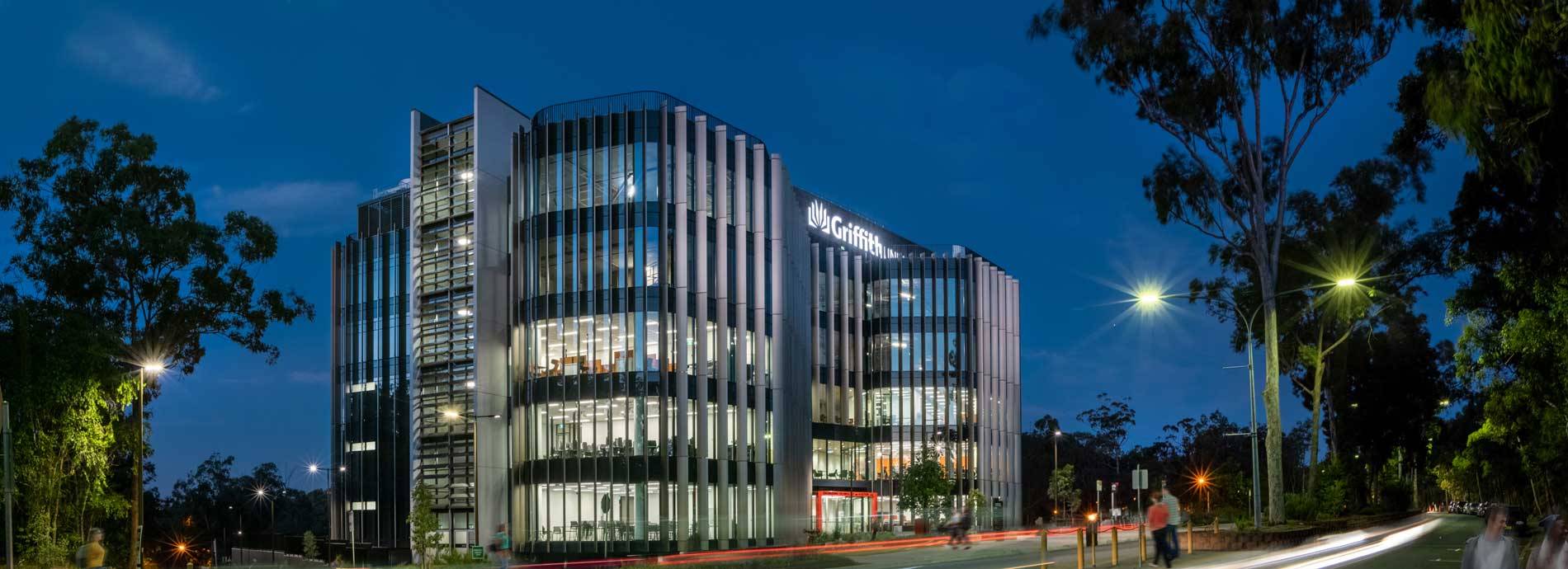
After self-reporting wage discrepancies, Griffith University commits to full remediation and reforms to prevent future underpayments. Photo credit: Griffith University
Griffith University to Repay Over $8 Million in Staff Underpayments
|
Griffith University has agreed to repay more than $8.34 million to 5,457 current and former staff following the discovery of widespread underpayments spanning nearly a decade. The underpayments, which include wages, interest, and superannuation, affected employees across all faculties and campuses, with shortfalls ranging from less than $1 to over $92,000. The university self-reported the issue to the Fair Work Ombudsman in 2022 after identifying errors in payroll processes related to tutorial rates, subject coordination, proctor duties, and fitness staff allowances, among others. This proactive approach led to an enforceable undertaking requiring Griffith to backpay affected staff and implement measures to ensure future compliance.
|
|
The root causes of the underpayments were linked to insufficient training of administrative staff, inadequate payroll review systems, and a lack of automation, which allowed human error to persist unchecked. To address these systemic issues, Griffith University has committed to upgrading payroll and record-keeping systems, providing additional staff training, and commissioning independent audits. Furthermore, the university will establish a consultative body involving management, employees, and the National Tertiary Education Union to improve workplace relations and compliance monitoring. A contrition payment of $175,000 will also be made to the Cleaning Accountability Framework, supporting fair working conditions for cleaners.
|
|
This case highlights ongoing challenges within the Australian university sector, where wage theft and underpayments have been increasingly exposed. Griffith joins several other institutions that have entered similar agreements with the Fair Work Ombudsman since 2022, reflecting a broader push for accountability and reform. Fair Work Ombudsman Anna Booth praised Griffith for its cooperation and commitment to rectifying the issue, emphasizing the importance of robust systems to prevent such breaches. The university’s actions set a precedent for improved transparency and fairness in higher education employment practices.
|

False positive STI results caused distress for patients at Auckland City Hospital, prompting urgent investigations and apologies. Photo credit: 123rf.com
Auckland Hospital Apologises After 25 Patients Falsely Diagnosed with STIs
|
Twenty-five patients
at Auckland City Hospital were wrongly told they had sexually transmitted infections (STIs) due to false positive test results processed in the hospital’s internal laboratory between May 23 and June 4. The error was uncovered after clinical staff questioned one suspicious result on June 4, leading to the discovery of four affected test batches. Health NZ/Te Whatu Ora has apologised for the distress caused, with hospital officials actively contacting all affected patients, though six remain uncontacted as investigations continue. The issue appears linked to contamination in the lab’s testing workflow, and testing has been moved to different equipment pending a full root cause analysis.
|
|
The incident has raised concerns about the emotional and social impact on patients who were incorrectly informed of having an STI, particularly those receiving obstetrics and gynaecology care. Health officials emphasised that no patients were falsely reassured about not having an infection, but acknowledged the anxiety and potential relationship strain caused by the false diagnoses. The hospital is committed to improving laboratory processes and communication protocols to prevent similar errors in the future, underscoring the importance of accuracy and sensitivity in STI testing and patient care.
|
PALM WORKERS
💵Challenges and Reforms for Unclaimed Superannuation Among Pacific Workers in Australia’s PALM Scheme
|
Many Pacific and Timor-Leste workers participating in Australia’s PALM scheme are leaving millions of dollars in superannuation unclaimed due to complex administrative barriers, language difficulties, limited internet access, and lack of employer support, with funds only accessible after returning home through a complicated, English-only online process. Workers on short-term visas accumulate thousands of dollars in superannuation, but many prefer immediate access to their earnings to support their families, prompting calls for reforms such as paying superannuation directly into home country funds or as part of wages. Addressing these issues is important not only for the financial well-being of workers but also for strengthening Australia’s strategic relationships with Pacific nations by supporting economic prosperity and skills transfer.
|
⚒️Pacific PALM Workers Left Stranded and Vulnerable After Contract Completion
|
Many Pacific seasonal workers under Australia’s PALM scheme are being left stranded and homeless after their contracts end, facing difficulties such as lack of support, limited access to services, and uncertainty about returning home. Reports highlight that some workers experience hardship, including mental health challenges, as they struggle with housing and transport while awaiting repatriation. The situation has drawn criticism of the program’s management and calls for improved protections and support mechanisms to ensure workers are not abandoned once their employment concludes.
|
SPORTS
Pacific Mini Games 2025: Top Athletes and Defending Champions Ready for Koror
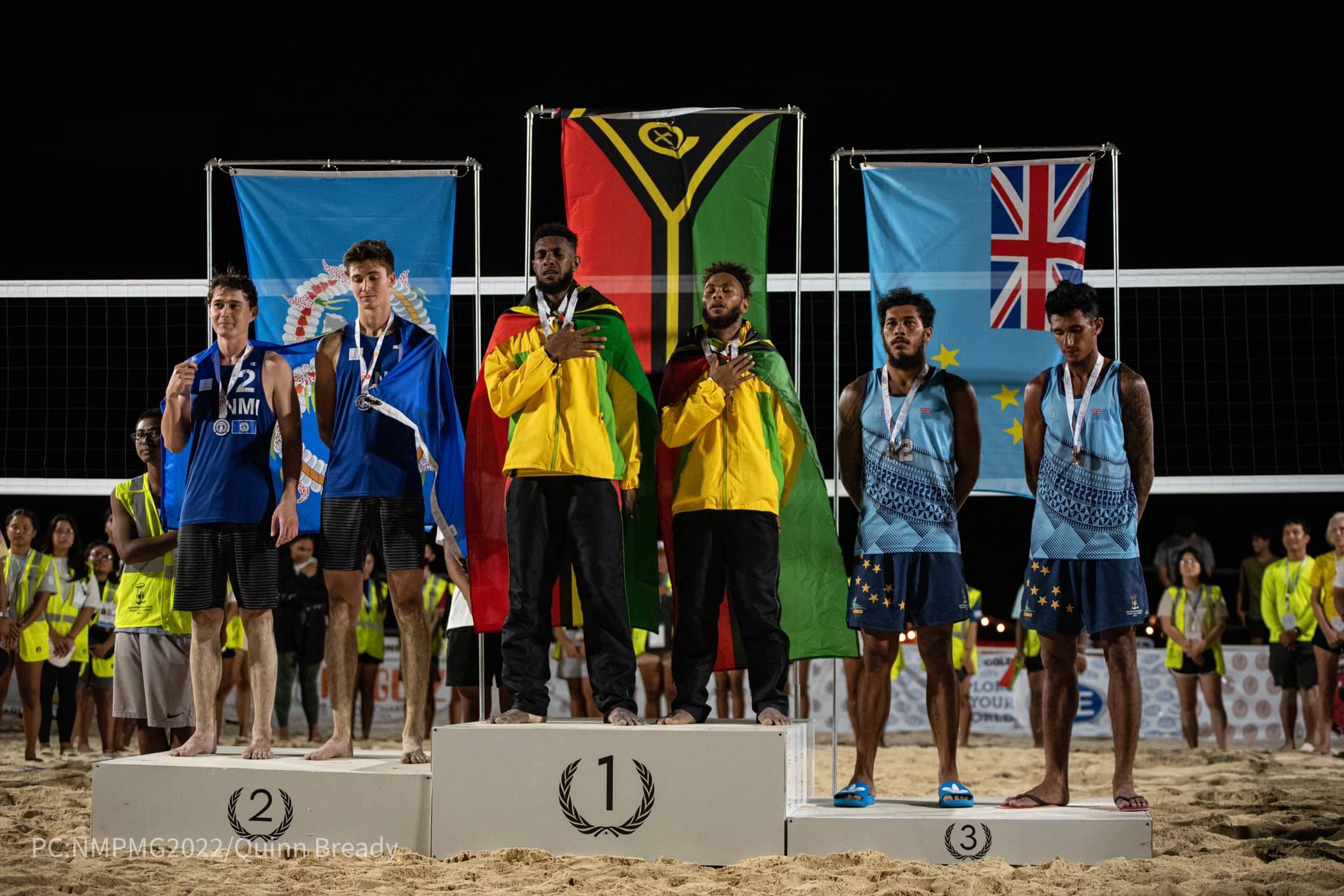
Over 1,500 athletes from 23 Pacific nations will compete from June 29 to July 9 in Palau, with fierce rivalries and record holders set to shine. Photo Credit: Palau Mini Games 2025
|
The Pacific Mini Games 2025
, held in Koror, Palau, will feature more than 1,500 athletes from 23 Pacific nations competing across 12 sports, including athletics, basketball, swimming, and va’a. Fiji, sending a strong team of 186 athletes, and Australia, with 20 promising competitors, are among the largest contingents. Key athletes to watch include Australia’s rising track stars Zoe Chester and Aden McDonald. The Games provide an important stepping stone for athletes seeking to build on regional success and gain international experience.
|
|
Looking back at the 2023 Pacific Games in the Solomon Islands, New Caledonia dominated the medal tally with 82 golds and 197 total medals, followed by Tahiti and Australia. Papua New Guinea, a powerhouse in Pacific sport, finished fifth overall with 29 gold medals and 105 total, and is among the defending champions expected to be strong contenders in Koror. Notable record holders from the last Games include New Caledonia’s John-William Dabin, who set a new swimming record in the men’s 200m backstroke, and weightlifting champions like Papua New Guinea’s Dika Toua, who continues to inspire the region.
|
|
Despite the excitement, many countries have faced significant challenges in preparing for the Games, including limited funding, logistical difficulties, and travel restrictions. Papua New Guinea
has struggled with budget constraints, impacting athlete preparation and participation, while smaller island nations have contended with high travel costs and limited resources. These challenges highlight ongoing disparities in access and support across the Pacific, underscoring the resilience of athletes and officials committed to competing on this important regional stage.
|
SPOTLIGHT

Rising womb cancer rates linked to metabolic diseases highlight urgent health challenges for Pacific and Māori communities. Photo credit: 123rf
Womb Cancer Disproportionately Affects Pacific and Māori Women in New Zealand
|
Womb cancer, also known as endometrial cancer, is increasingly impacting Pacific and Māori women in New Zealand, with rates among the highest globally. A University of Auckland biologist, Dr. Cherie Blenkiron, points to rising diagnoses—from around 600 cases a decade ago to approximately 750 annually—particularly affecting younger women aged 30 to 40, a shift from the traditional postmenopausal onset. Research indicates that metabolic conditions such as obesity and diabetes are major contributing factors, disproportionately affecting these communities and driving the upward trend in cases.
|
|
The Pacific region faces a broader cancer burden, with cervical cancer remaining a leading cause of death among women. The Republic of the Marshall Islands, for example, reports some of the highest cervical cancer incidence rates worldwide, exacerbated by cultural barriers, limited screening, and vaccine hesitancy. Efforts like the Marshall Islands’ National Cervical Cancer Elimination Policy
and vaccination campaigns targeting young girls aim to address these challenges, emphasizing prevention through HPV vaccination and improved screening methods, including self-testing to overcome privacy concerns.
|
Dr Blenkiron said
it is a type of cancer that can be removed if found early.
"Women will present with symptoms, and that really means that if they act on those symptoms...we can pick up the cancer early, we can treat it early, and this is a type of cancer that can be cured very easily with surgery or really limited forms of drugs.”
|
REGIONAL EVENTS
-
Pacific Mini Games 2025
| Event |
Date |
Location |
Details |
| Games Village Opens |
Thursday, 26 June 2025 |
Koror, Palau |
Athletes begin arriving and settling into the Games Village. |
| Opening Ceremony |
Sunday, 29 June 2025 |
Koror, Palau |
Colorful celebration marking the start of the Pacific Mini Games. |
| Competitions |
30 June – 9 July 2025
Rest Day: 6 July
|
Various venues in Koror, Airai, Melekeok, Ngiwal |
Sports include Athletics, Baseball, Triathlon, Swimming, Weightlifting, Judo, Wrestling, Table Tennis, Va‘a, Beach & Indoor Volleyball, Softball, and Archery.
|
| PGC General Meeting |
Sunday, 6 July 2025 |
Koror, Palau |
Meeting of the Pacific Games Council during the competition period. |
| Closing Ceremony |
Wednesday, 9 July 2025 |
Koror, Palau |
Final event including medal celebrations and cultural performances. |
|
-
Puanga Festival
-
When:
📅 Friday, 20 June 2025
-
Where:
📍 Central Energy Trust Arena - Pit Lane, 61 Pascal Street, Palmerston North Central, 4410
-
Time:
🕠 03:00 PM - 07:00 PM
Celebrate the Māori New Year with whānau and friends in Palmerston North. The theme for this year’s event is ‘Honoring the past, Enjoying the present, Looking forward to the future’, which speaks to the meaning of Puanga – a time to reflect, reconnect and reset for the year ahead.
Find Out More
|
QUICK TAKES
- Consumer advocacy group CHOICE tested 20 popular Australian sunscreens labeled SPF 50 or 50+ and found that only four met their stated sun protection factor claims, with several products falling significantly short. The worst performer was Ultra Violette’s Lean Screen SPF 50+ Mattifying Zinc Skinscreen, which returned an SPF of just 4 in CHOICE’s tests, a result the brand strongly disputed, citing independent lab tests showing SPF values above 60. CHOICE
defended its rigorous testing methods, including using 10-person panels and amber glass jars to prevent degradation, and called on the Therapeutic Goods Administration (TGA) to investigate the discrepancies. Other well-known brands such as Cancer Council had some products that failed to meet claims, while La Roche-Posay, Neutrogena, and Mecca Cosmetica performed well. Despite the controversy, CHOICE emphasized that wearing any sunscreen remains crucial for sun protection and urged consumers to continue sun-safe habits.
-
The University of Guam (UOG)
The University of Guam (UOG), in partnership with the Office of the Governor, has launched the Guam Green Growth (G3) Guam Restoration of Watersheds Conservation Corps (G3 GROW Corps), a new workforce program focused on restoring Guam’s ecosystems and fostering a green economy. This six-month initiative will select six full-time participants who will receive training in reforestation, watershed protection, coral reef restoration, and various conservation techniques, while earning a biweekly stipend of $1,300. Supported by the U.S. Department of Agriculture Forest Service and Kupu Hawai‘i’s MALU program, the G3 GROW Corps aims to develop skilled environmental stewards who will actively contribute to protecting Guam’s natural resources, expanding on the broader Guam Green Growth initiative aligned with the UN Sustainable Development Goals.
- At the 6th Pacific-France Summit held in Nice on June 10, 2025, French President Emmanuel Macron reaffirmed France’s commitment to the Pacific region, highlighting cooperation in environment, defense, and geostrategy, including a €2 million contribution to the Pacific Resilient Facility and new air links connecting French Polynesia with other Pacific nations. A significant focus was on New Caledonia
, where Macron addressed the aftermath of the May 2024 riots, emphasizing France’s respect for past referendums on independence and ongoing efforts to restore dialogue and stability, including over €3 billion in reconstruction funding. Macron announced plans for a summit in Paris to develop a new political project for New Caledonia’s future, rejecting further referendums and advocating for a consultative approach more aligned with Pacific cultures. The summit also covered regional challenges such as climate change, illegal fishing, and transnational crime, with France, Australia, and New Zealand continuing joint maritime security efforts alongside Pacific Island nations.
|
Was this email forwarded to you? Sign up here:
|
|
